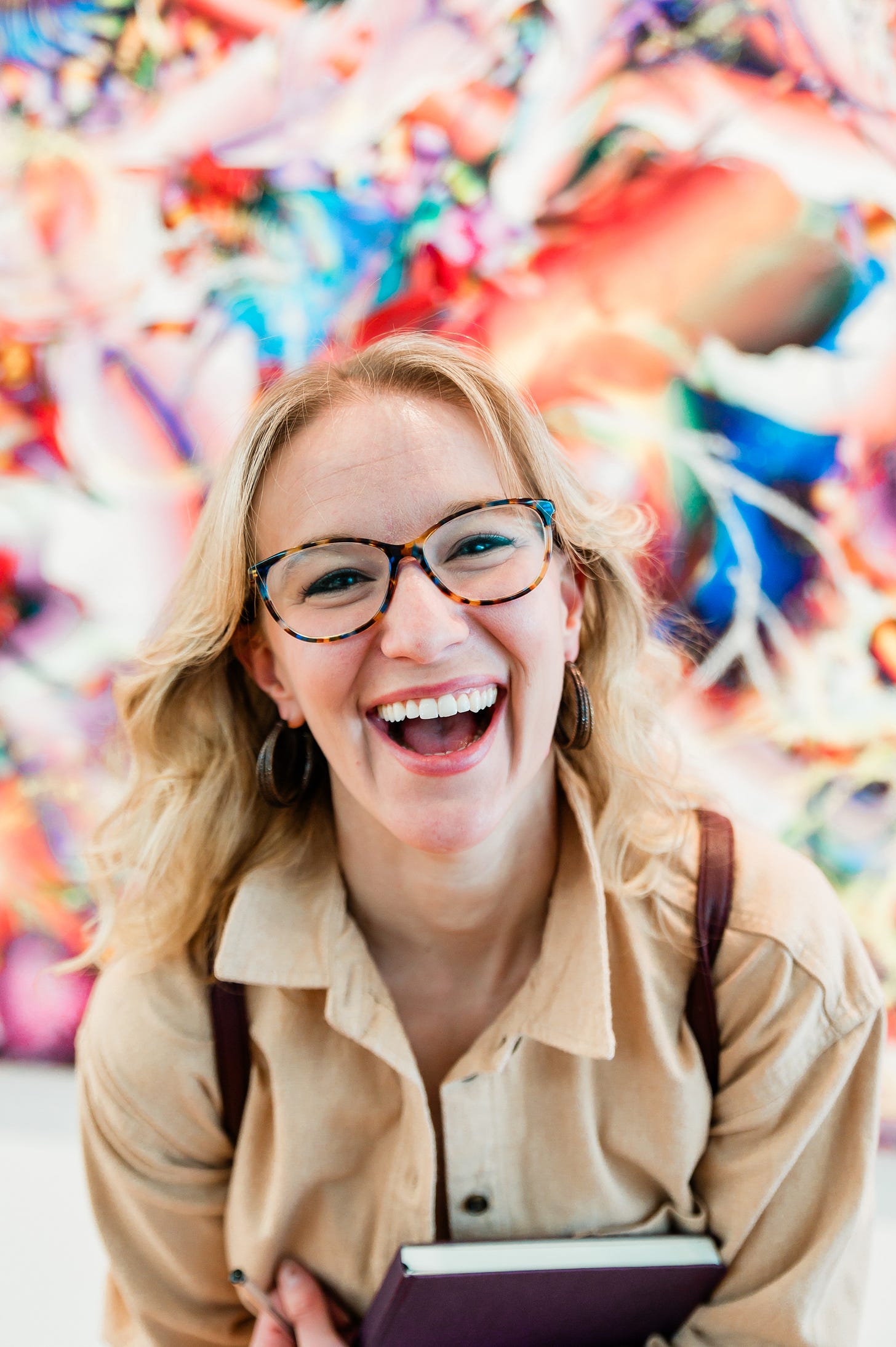BONUS PRIDE MONTH POST: ADHD and the greatest love of all
Exploring the neuroqueer overlap and "unmasking" to battle stigma and find self love

Why is hate possible? Because of misunderstanding. You can’t love something you don’t understand.
One of my favorite songs by the absolute best voice of all time (this is not up for debate, but if you need convincing, just watch this - jump to the 8-minute mark for chills - then come back) is The Greatest Love of All by Whitney Houston. When I was unemployed last spring, I may have lip synced my way through the Whitney biopic “I Wanna Dance with Somebody” more than once. I get the shivers hearing that woman sing. What a talent!
Did you feel that? Did you, too, get a sad feeling immediately after thinking of her?
So often when we reflect on the magic of Whitney, we also conjure the ghosts… the tragedy of a musical phenom gone too soon, a treasured gem that was never able to fully shine as her true authentic self. For those who aren’t aware, Whitney Houston was a closeted member of the LGBTQ+ community.
While I can’t speak to Whitney’s neurotype, there is mounting evidence that suggests a strong overlap between neurodivergence and queerness. In this article on The Swaddle author Devrupa Rakshit shares her thoughts on this intersection:
“‘Coming out’ is a phrase we tend to associate with individuals from the LGBTQ+ community. But it’s a phrase that often captures an integral milestone in the journey of self-acceptance that many neurodivergent individuals undertake, too, especially if they’re diagnosed late.
Interestingly, the journeys of coming to terms with one’s neurodivergence — in a neurotypical world — and of accepting one’s queer identity — in a heteronormative society — aren’t just parallel. On occasion, they merge as well.
Studies suggest that individuals with gender and sexual identities outside the cis-hetero binary were also three to six times more likely to have a diagnosis of autism. This excludes autistic individuals who remain undiagnosed, suggesting that the overlap could, in fact, be greater. Researchers have also observed higher rates of OCD and ADHD diagnoses among queer individuals — reiterating the overlap between neurodivergent and LGBTQ+ identities.”
The link is so strong that a term has emerged to encompass the experience of those inside this venn diagram overlap: neuroqueerness.
While I am not queer myself, I do feel a sense of solidarity with those in this community, especially my neuroqueer brothers and sisters, who have had to go through the aforementioned journey of self-discovery as well as battling societal pressures, norms, and expectations - TIMES TWO!
For many years, I didn’t fully understand myself. I dealt with decades of frustration and shame because of an invisible disability I never knew I had. Then came the frustration and shame of discovering this disability and being unsure of where I am safe to disclose it.
I don’t pretend to know any small fraction of the pain Whitney or my neuroqueer peers have experienced. And while I would NEVER claim to understand or speak for it (and I am aware that people in the LGBTQ+ community, as well as those with intersectionalities like race or religion that further complicate things, face far more serious consequences and dangers than I could ever fathom) I CAN empathize with their experience.
On some level, I know what it’s like to face fear, stigma, and shame for being who I am. Being petrified to lose everything I’ve worked for and everyone I love, because of some letters I identify with that make me a little different.
It’s a daily game of dress up, sorting through masks to suit my company. Depending on the environment, it’s either safe to be myself or best to hide and conform to avoid judgement or consequence. I’ve been doing it all my life, enough to even fool myself. My skill at masking is not far off from Whitney-level greatness. A masking phenom!
So that’s what I wanted to explore: the idea of “coming out” or “unmasking” and what happens when we spend our lives hiding our full selves.
Is there inherent consequence to living in fear?
SPOILER ALERT: There is. Big time.
People who aren’t able to be their authentic selves, who are forced to live in hiding, have not only their mental health conditions exacerbated, but physical ones, as well. When you stifle yourself, you quite literally make yourself sick.
I was touched by an article in Newsweek about this. It shares a 2020 Harvard study that found that the average number of years taken off a person’s life from living in fear and stigma is 12 years. 12 freaking years.
I wonder how many earth-moving Whitney ballads we missed out on because she could never truly be herself.

Pulling from the article (assuming you have ADHD and don’t want to read the whole thing yourself): In a qualitative survey of transgender individuals aged 61 and older about aging:
“More than 70 percent stated they believe they are aging successfully, attributing some of their success to a combination of self-acceptance, personal agency, and nurturing, supportive relationships.”
Essentially, it found that when we accept our whole selves and feel accepted by others for that whole self, we thrive.
Why do people hide then?
People hide because of the hate, ignorance, and hostility they experience when others don’t take time to understand them.
And this is very real. Especially for those in the LGBTQ+ community.
But here’s the thing: We battle hate with knowledge and education. After all, why is hate possible? Because of misunderstanding. You can’t love something you don’t fully understand.
I couldn’t love myself until I knew my whole self, until after my ADHD diagnosis. I fought self-loathing with self-knowledge. It allowed me to forgive my shortcomings and embrace my unique strengths. Now I try to educate others to help destroy the very stigma that makes me want to hide.
I’m stepping out though it feels scary. I’m being vocal about my condition to show the world that ADHD might be different than what they think. To show the world it doesn’t really matter what they think anyway.
It took my diagnosis and my subsequent “unmasking” to become what I always needed: an unconditional source of love for myself.
Whether you’re neurodivergent, queer, neuroqueer, or none of these identities, we ALL have a role to play in creating a world that’s safe for everyone to be themselves.
Here are some suggestions for how we can all help battle stigma, conquer hate, and tap into inner love:
Find your community. Surround yourself with people who get you. Tuck yourself into cozy, safe places where you are accepted and celebrated as you are.
Be you. Unmask. Come out. Even if it’s just in those small, safe places where you feel you can. Fight stigma by being proud of whoever it is you are. Don’t deprive the world of the complete beauty inside you.
Get uncomfy. Educate yourself. Not just about your own self and experience, but about the experiences of others. Build empathy. Love someone different than you. Be humble and willing to hear alternative viewpoints. Have uncomfortable conversations. Discover how much we all have in common despite our unique challenges, beliefs, backgrounds, and experiences.
While I mentioned that I am not queer, I love a lot of queer people, and I believe now more than ever it’s important to support and acknowledge LGBTQ+ rights as fundamental human rights. In honor of Pride Month, I’m sharing this list as a place for anyone who isn’t queer to start this education. Then once you educate yourself… go out and educate others.
Decide to be radical and love yourself the way you seek to be loved. Refuse to tie your own happiness to the approval of others. That thing you did that you wish your boss would recognize? Recognize yourself for it. The sweet nothings you’d wish your partner would drape you in as you fall asleep each night? Drape yourself in them. The things you want to be known for by those around you? Know for yourself.
Here’s an exercise: think of those things, the compliments you want to get from your partner, friend, parent, coworker, boss, or teacher. Write them down. Every single thing you wish someone would tell you about yourself, there’s a reason you wrote them down. It’s because this is where you have put your energy.
BREAKING NEWS!!! Where you put your energy, you already are.
You already are these things, because this is where your heart is. And who knows your heart better than you do? You don’t need someone else to acknowledge your worth to be worthy.
Once you discover your value… own it. Don’t go back into the shadows lurking behind someone in your life waiting for a stray ray of sunshine to grace you. You don’t need their approval. Jump into the light. You belong there.
It’s okay to be scared, but you deserve to see the brightness of day. Your full self in all its messy human glory.
You deserve to come out and find the greatest love of all: the one you give yourself.





